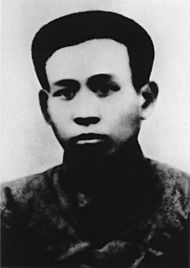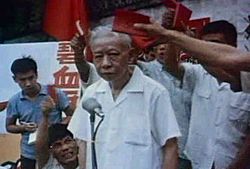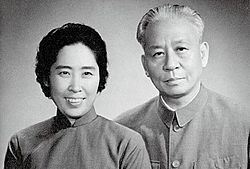Liu Shaoqi facts for kids
Quick facts for kids
Liu Shaoqi
|
|
|---|---|
|
刘少奇
|
|
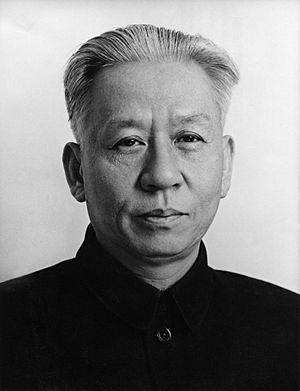 |
|
| 2nd Chairman of the People's Republic of China | |
| In office 27 April 1959 – 31 October 1968 |
|
| Premier | Zhou Enlai |
| Vice President | Dong Biwu and Soong Ching-ling |
| Leader | Mao Zedong (Chairman of the Chinese Communist Party) |
| Preceded by | Mao Zedong |
| Succeeded by | Dong Biwu and Soong Ching-ling (acting) |
| 1st Chairman of the Standing Committee of the National People's Congress | |
| In office 15 September 1954 – 28 April 1959 |
|
| Preceded by | Position established |
| Succeeded by | Zhu De |
| First Vice Chairman of the Chinese Communist Party | |
| In office 28 September 1956 – 1 August 1966 |
|
| Chairman | Mao Zedong |
| Preceded by | Position established |
| Succeeded by | Lin Biao |
| Member of the National People's Congress | |
| In office 15 September 1954 – 21 October 1968 |
|
| Constituency | Beijing At-large |
| Personal details | |
| Born | 24 November 1898 Ningxiang, Hunan, Qing Empire |
| Died | 12 November 1969 (aged 70) Kaifeng, Henan, People’s Republic of China |
| Nationality | Chinese |
| Political party | Chinese Communist Party (1921–1968) |
| Spouses |
|
| Children | 9 (including Liu Yunbin and Liu Yuan) |
| Liu Shaoqi | |||||||||||||
|---|---|---|---|---|---|---|---|---|---|---|---|---|---|
| Simplified Chinese | 刘少奇 | ||||||||||||
| Traditional Chinese | 劉少奇 | ||||||||||||
|
|||||||||||||
Liu Shaoqi (pronounced Liú Shàoqí; 24 November 1898 – 12 November 1969) was an important Chinese leader. He was a revolutionary, a politician, and a thinker. He helped shape China's government and economy for many years.
Liu held several high positions in China. He was the Chairman of the National People's Congress Standing Committee from 1954 to 1959. He also served as the First Vice Chairman of the Chinese Communist Party from 1956 to 1966. From 1959 to 1968, he was the Chairman of the People's Republic of China, which is like being the country's president. During this time, he worked on rebuilding China's economy.
For about 15 years, Liu was one of the top leaders in China. He was second only to Chairman Mao Zedong and Premier Zhou Enlai. At first, many thought he would take over from Mao. However, Liu and Mao disagreed on some important ideas in the early 1960s. This led to a big conflict.
Starting in 1966, Liu was criticized and removed from power by Mao. In 1968, he disappeared from public life. He was accused of being a "capitalist-roader" and a "traitor." He was put in prison during a period called the Cultural Revolution. After his death, in 1980, the government under Deng Xiaoping officially cleared his name. He was given a national memorial service.
Contents
Biography
Early Life and Education
Liu Shaoqi was born on November 24, 1898. His family was a moderately wealthy farming family in Ningxiang, Hunan province, China. He went to Ningxiang Zhusheng Middle School.
In 1920, he joined a group called the Socialist Youth Corps. The next year, he went to study in Moscow, Russia, at the University of the Toilers of the East. This school was for people who wanted to learn about communism.
Joining the Communist Party
Liu joined the new Chinese Communist Party (CCP) in 1921. He returned to China in 1922. He became the secretary of the All-China Labor Syndicate. In this role, he led several strikes for railway workers. These strikes took place in the Yangzi Valley and at Anyuan.
Early Political Work
In 1925, Liu became part of the All-China Federation of Labor Executive Committee. This group was based in Guangzhou. Over the next two years, he led many political campaigns and strikes. He worked in Hubei and Shanghai.
In Shanghai, he worked with Li Lisan to organize Communist activities. This happened after an event called the May Thirtieth Incident in 1925. After Shanghai, Liu went to Wuhan. He was briefly arrested in Changsha. Then he returned to Guangzhou to help organize a long strike that lasted 16 months.
Rising Through the Ranks
Liu was elected to the Party's Central Committee in 1927. He was put in charge of the Labor Department. In 1929, Liu went back to work at the Party headquarters in Shanghai. He was named Secretary of the Manchurian Party Committee.
In 1930 and 1931, he attended important meetings of the Central Committee. He was elected to the Central Executive Committee, which is like the Politburo, in 1931 or 1932. Later in 1932, he moved to the Jiangxi Soviet, a Communist-controlled area.
Becoming a Senior Leader
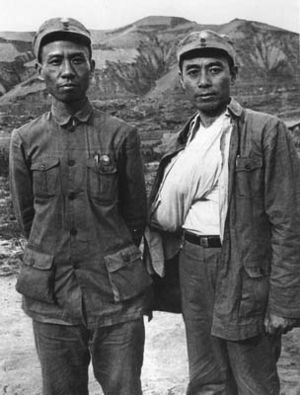
Liu became the Party Secretary of Fujian Province in 1932. He took part in the Long March in 1934. This was a famous journey where the Communists moved their base. After the Long March, Liu was sent to areas controlled by the Kuomintang. His job was to reorganize secret Communist activities in northern China.
In 1936, he became Party Secretary in North China. He led movements against the Japanese in that area. He worked with other important leaders like Peng Zhen. Some people believe his group's actions led to the Marco Polo Bridge Incident in 1937. This event started the Second Sino-Japanese War.
In 1937, Liu traveled to the Communist base in Yan'an. In 1941, he became a political leader in the New Fourth Army. In 1945, he was elected as one of five CCP Secretaries. After this, he became a top leader for all Communist forces in Manchuria and northern China.
After the Revolution
Liu became the Vice Chairman of the Central People's Government in 1949. In 1954, China created a new constitution. Liu was elected chairman of the National People's Congress's Standing Committee. He held this position until 1959. From 1956 until 1966, he was the First Vice Chairman of the Chinese Communist Party.
Liu focused on how the Party was organized and its ideas. He believed in a strong government that planned the economy. He also thought that heavy industry should be developed. He wrote books about his political and economic ideas. His most famous books include How to be a Good Communist (1939).
Chairman of China
Liu strongly supported the Great Leap Forward in May 1958. This was a plan by Mao Zedong to quickly develop China's economy. Liu, along with Deng Xiaoping, supported Mao's ideas.
Because of this, Liu gained more power in the Party. In April 1959, he took over from Mao as Chairman of the People's Republic of China. This made him the country's president. However, Liu started to worry about the results of the Great Leap Forward in August 1959.
To fix the problems, Liu and Deng led economic reforms. These changes made them more popular within the Party and with the public. Their economic policies were more careful than Mao's radical ideas.
Disagreement with Mao
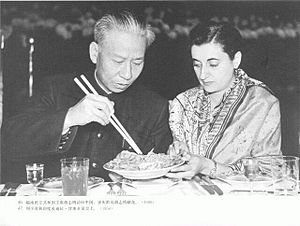
In 1961, Liu was publicly seen as Mao's chosen successor. But by 1962, Mao no longer trusted him. This was because Liu disagreed with Mao's policies. After Mao regained his power in the 1960s, Liu's removal from power became very likely.
Liu was the second most powerful leader in the Party. This position contributed to Mao's rivalry with him. Their disagreement was more about power than just different political ideas. This was especially true after the Seven Thousand Cadres Conference. It showed that Liu's later troubles were part of a power struggle.
By 1966, many senior leaders in China felt the Party needed big changes. They wanted to fight corruption and bureaucracy. Liu himself led a meeting that officially started the Cultural Revolution. This movement aimed to reform the government.
However, Liu and his allies quickly lost control of the Cultural Revolution. Mao used the movement to gain more political power. He also used it to remove people he saw as his enemies.
The Cultural Revolution started in 1966. It strongly supported Mao. It gave Mao the power to remove his political enemies from high government positions. During this time, schools and universities were closed. Mao encouraged young Chinese people to destroy old buildings and art. He also told them to attack their teachers and Party leaders.
Mao became extremely powerful. He was seen as almost a god. He removed anyone he suspected of opposing him. He directed the masses and the Red Guards to destroy many government and Party organizations. Many senior Party members who had hesitated to follow Mao were removed. This included Liu Shaoqi and Deng Xiaoping. They and their families were publicly criticized and humiliated.
Liu and Deng were called "capitalist roaders." Liu was even called a "traitor" and "the biggest capitalist roader in the Party." In July 1966, Lin Biao replaced Liu as Party Deputy Chairman. By 1967, Liu and his wife, Wang Guangmei, were held under house arrest in Beijing.
Liu's economic ideas were attacked. These included his "three freedoms and one guarantee." This idea supported private land plots and free markets. He was removed from all his positions and kicked out of the Party in October 1968. After his arrest, Liu was no longer seen in public.
Downfall, Death, and Clearing His Name
At the Ninth Party Congress, Liu was accused of being a traitor and an enemy agent. Zhou Enlai read the Party's decision. It said Liu was a "criminal traitor, enemy agent and scab." Liu's situation did not get better after this. He died soon after.
Liu died in prison from health problems on November 12, 1969. He died under a different name in Kaifeng. He was cremated the next day. His doctor said that Liu received medical care for his illness. He had pneumonia many times due to a weak immune system. Top medical experts held many meetings about his treatment. A medical team watched him daily and tried their best.
In February 1980, Liu's name was officially cleared. This happened after Deng Xiaoping came to power. The Chinese Communist Party said that Liu's removal was unfair. They removed the labels of "renegade, traitor and scab." They declared him a "great Marxist and proletarian revolutionary." He was recognized as one of the Party's main leaders.
Lin Biao was blamed for making up false evidence against Liu. A big national memorial ceremony was held for Liu on May 17, 1980. His ashes were scattered into the sea at Qingdao. This was what he had wished for.
On November 23, 2018, Xi Jinping, the leader of the Chinese Communist Party, gave a speech. He did this to remember Liu Shaoqi's 120th birthday.
Personal Life
Liu Shaoqi was married five times. His wives included He Baozhen and Wang Guangmei. His third wife, Xie Fei, was one of the few women who took part in the 1934 Long March.
His wife at the time of his death, Wang Guangmei, was also put in prison by Mao Zedong. She was held alone in harsh conditions for over ten years.
His son, Liu Yunbin, was a famous physicist. He was also treated badly during the Cultural Revolution. He died in 1967. Liu Yunbin's name was also cleared in 1978.
See also
 In Spanish: Liu Shaoqi para niños
In Spanish: Liu Shaoqi para niños
- History of the People's Republic of China
- Liu Shaoqi's Former Residence
 | James Van Der Zee |
 | Alma Thomas |
 | Ellis Wilson |
 | Margaret Taylor-Burroughs |


